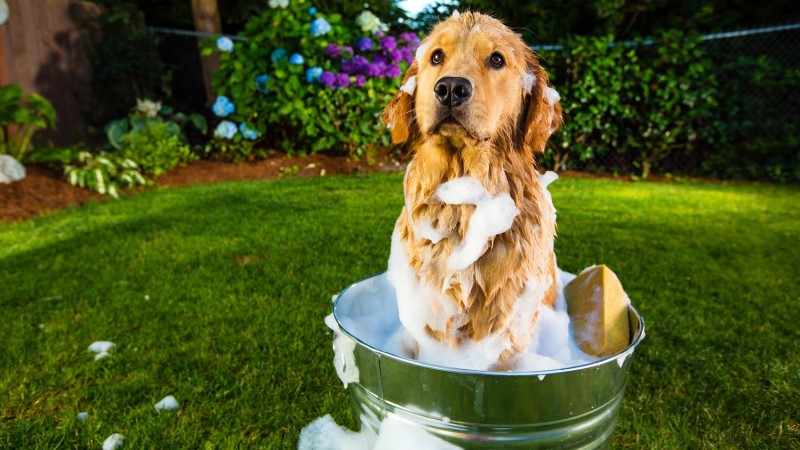There isn't a perfume company out there that has invested in "Eau de Dog," and with good reason. Most of our pooches have a tendency to be malodorous from time to time, whether it's the stench coming from the moisture between their toes, their bad breath, or the unmistakable whiff of foul air as they enter the house after a walk in the rain. Yes, even the best dogs can make our eyes water for a variety of reasons.
However, while most odors have a simple solution, some can be caused by more serious underlying problems. Let's take a look at why our four-legged friends smell so bad and what we can do about it.
Dog Dental Problems
The number one cause of bad breath in dogs, just like people, is the build-up of plaque and tartar on their teeth. Some small breeds are especially prone to dental problems like gum disease. Another problem specific to certain breeds is Gingival Hyperplasia, the overgrowth of the gums that can harbor small bits of food and produce a rotten smell.
Keeping your dog's teeth clean at home is the first step in solving this problem, but ultimately your pet may need a dental cleaning from a veterinary professional. If you have DefenderPlus coverage offered by AKC Pet Insurance (underwritten by Independence American Insurance Company), you may be reimbursed for a portion of teeth cleaning costs.
Canine Flatulence (Dog Farts)
Canine flatulence (known to most of us as "dog farts") is a common problem in dogs, and if your pup can clear the room after passing gas, it is often due to an intolerance to an ingredient in their food.
Working with your veterinarian to switch to a different diet, whether that be grain-free or fish-based, can often solve the problem. However, excessive canine flatulence can sometimes signal an underlying medical issue, so if the air around your pet remains foul, continue to consult your licensed veterinarian until the problem is resolved.
Atopy
Seasonal or food allergies can cause inflammation of the skin that can lead to excessive oil secretions from certain glands, which can produce a musty smell and even cause skin infections if left untreated.
Poor diet can contribute to your dog's allergies as well, and can also be the cause of other problems, including yeast infections, which can also lead to foul odors. A diet high in carbohydrates and dog kibble that is highly processed can be the root cause of your dog's allergic reactions. If you think this may be the issue, switch your pup over to a high-protein, non-processed dog food, or try using allergy tablets for dogs that can help with these types of reactions and symptoms.
Dog Ear Infections
There are many types of bacteria and yeast that can cause canine ear infections. A healthy ear usually has good defenses to fight off the bacteria, but if your dog suffers from allergies or hormonal imbalances, the yeast and bacteria can increase dramatically, causing a dreadful smell. Dogs with hairy or floppy ears, such as Basset Hounds and Springer Spaniels, may have consistent ear problems unless their ears are kept clean and dry.
Canine Anal Sacs
This is one of the most common causes of stinky dogs. All canine companions have two small scent sacs on their bottoms that act as marking glands, which is why dogs smell rear ends when introduced. If these sacs become impacted, it can cause the dog pain, not to mention result in a extremely smelly secretion that remains on the fur. Another sign your dog has problems with their anal glands is “scooting,” or dragging their bottom on the ground. Make an appointment with your veterinarian if your dog exhibits this type of behavior.
What to Do About All That Dog Stink
- Implement a dog dental hygiene routine early to prevent avoidable problems: This can include annual dental cleanings, brushing your dog’s teeth at home, and even using certain dog chews to help reduce tartar buildup.
- Keep the folds in your dog's skin and ears clean and dry: Check their ears periodically and be sure to dry them after swimming or bathing.
- Feed your dog a healthy diet: If you suspect your dog’s diet might be the culprit, try a diet with different ingredients. Consult your veterinarian for recommendations.
- Bathe your dog regularly: This is an obvious (yet often neglected) solution that gets rid of many of the everyday -- and even not so ordinary -- smells that come from dogs.
If the dog odor persists, consult your veterinarian, as some medical conditions can produce strange odors. Breath that smells fruity or sweet could indicate diabetes, while kidney disease or bladder infection can result in breath that smells like urine.
Take some of the stress out of pet ownership with Accident & Illness Coverage from AKC Pet Insurance (underwritten by Independence American Insurance Company). Our pet insurance plans are designed to be there when you need them, allowing you to focus more on the health of your pet and less on costly veterinary bills. Click here for a quote today!


